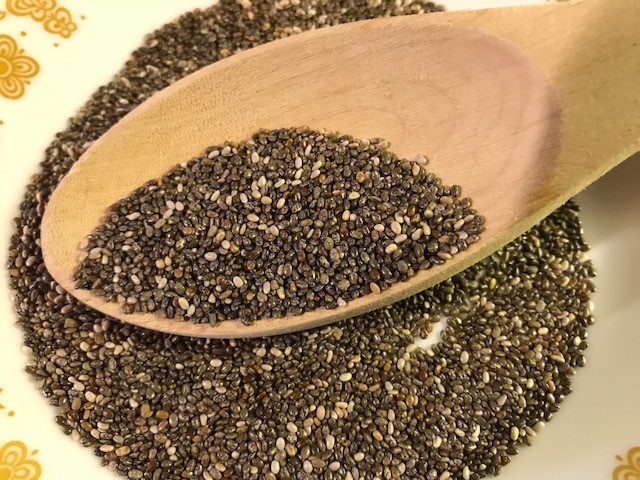March is National Nutrition Month, so we’ll keep going with our Parkinson’s’ superfood list. Next up is chia seeds and how they can help Parkinson’s low blood pressure.

When you stand up and feel light-headed it’s often due to low blood pressure or “orthostatic hypotension.” Your blood pressure isn’t high enough to adjust quickly to changes in body position. Since the blood must work against gravity to get to your brain, when you stand up, you get dizzy. Did you know this is common with Parkinson’s? I’m always surprised at how many people with PD don’t know this is a symptom and sometimes a side effect of medications.
When someone in my exercise class gets light-headed I ask, “How much water did you drink today?” The answer is almost always ”not enough” or “I’m not sure. I don’t think of it. I’m not that thirsty.”
If you have PD, you need to drink water constantly even if you are not thirsty!
By the time you are thirsty, your body is already in need of water. It is a signal to hydrate. Most people with PD don’t recognize the signal as something to act upon. This is a huge problem. If you are dizzy, you could fall and hit your head or break bones.
Every function in your body requires proper hydration to run efficiently. Read my previous blog post “The #1 Thing You Can Do to Nourish Your Brain with Parkinson’s” to learn more. Still not convinced you need more water? Water helps prevent:
- Low blood pressure and lightheadedness. Water increases blood volume increasing pressure.
- Dry mouth, which can lead to digestion and dental problems.
- Constipation. You need quite a bit of water to keep regular.
- Energy and stamina.
- Brain fog or confusion.
- Cramping of the muscles.
- Dry skin and eyes and other related dryness problems such as eczema.
- Kidney stones.
Chia Seeds and Dehydration
Chia seeds combat dehydration because they can absorb thirty times their weight in water. They can help regulate body fluid levels and retain electrolytes, both key in the battle against dehydration.
Chia, a member of the mint family, has been used by the Aztec, Mayan, and Inca Native Americans for centuries and are considered the “Indian Running Food.” For this reason, many athletes especially long-distance runners pre-hydrate themselves and carry water with chia seed in it.
Other reasons why chia seeds are especially good for people with PD:
- Chia contains a lot of fiber about 11 gms/oz. to keep you regular.
- Omega-3 fatty acids alpha-linolenic acid (ALA).
- Black chia is especially nutrient dense with antioxidants, iron and calcium, actually more than milk plus phosphorus and fiber.
- One ounce of chia seeds contains 5.6 grams of protein.
- Ground up chia seeds can be used in baking for a gluten-free substitute.
- Chia seed milk is higher in calcium and phosphorus for those who are choosing to go dairy-free.
How to Make Refreshing Fruit-Flavored Chia Water
- Put 3 tablespoons of chia seeds in a cup of warm water, stir well and let it sit for 10 minutes.
- Cover and place in the refrigerator and let sit overnight.
- The next day, pour your plumped-up chia seed water into a larger container filled with cold juice or cold water with chopped fruit or cucumbers.
- It will be tasty and entice you to drink more water. Enjoy!
There are many more recipes for smoothies, puddings, and baked goods online.
Caution with chia seeds, like flax seeds, when they are dry and added to liquid they absorb it. If you eat them dry, they expand and become a choking hazard. I suggest putting them in a smoothie or soup so they can pre-absorb the liquid, and you will be ingesting a lot of additional liquid to help slide them down.

If you are supposed to avoid seeds because of diverticulosis or other intestinal issues, ground them up into meal just like we did with the flax.